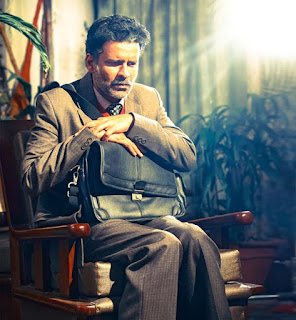When I read about Aligarh, I had no recollection of having read about the case of Prof Siras. For all it's all-pervading nature, the media is usually making so much of a big deal out of everything, that sometimes, you tend to overlook something you shouldn't have.
Aligarh is based on the incidents that happened in the life of Aligarh University professor Shrinivas Ramchandra Siras. A sting operation, his suspension from the university, the fight against it and the unsettling end. The great thing is that this is a story about the human psyche, the ideas of morality and the tussle between liberty and social conformity.The fact that it is about homosexuality is only incidental.
The greatest strength of the film is the way it develops the character of the Linguistics professor and the way Manoj Bajpai has portrayed it. A learned man, a poet, a man who loves what he does, enjoys music to the depth of his soul- a regular old man who has no time or space for anything revolutionary. Bajpai fills the frame on many occasions and completely captivates you as he speaks with every inch of his body. Complementing and almost matching him is Rajkumar Rao, playing the journalist who comes to Aligarh for the story but ends up forging a friendship with Siras. Their conversations are some of the best moments of the film- the older man's exasperation at the younger generation's fixation with 'labels', the way he explains how poetry lies between the lines- and how his face lights up as he speaks about poetry. Ashish Vidyarthi does justice to the role of the lawyer representing Siras.
Throughout the film, the director's vision shines through.The irony of social conditioning-as society is conditioned about sexual orientation, the protagonist is conditioned about sanctity of food in relation to caste- is expressed in a seemingly casual lunch scene. The close succession of two scenes of intimacy challenge the viewer's perception of 'normal'. The camera work and mise en scene work beautifully. Delightful touches like the professor using a towel on top of his pillow add to the feel. The end makes you restless, raises many a question; about the society we live in and our systems of law enforcement and justice.
Yes, there are a few flaws, although the great outweighs the not-so-great by a huge margin.There is inconsistency in the professor's accent. Whereas he utters the typical Urdu sounds like the epiglottal 'kha' very naturally, he's made to say 'ijjat' instead of 'izzat' to underline his Maharashtrian roots. Despite having lived in Aligarh for decades, he says 'bas, bas' (Marathi for 'sit') when urging someone to sit down. Also, I felt the film contradicts its own statement that not all people who stand for gay rights are gay. When the lawyer's assistant take the professor to a gay party, he says, 'These are the people who signed the petition in your support'.
But as I said, the positives absolutely outweigh the flaws. Hats off to Hansal Mehta for choosing to make this film, and making it so well. Watch it and it'll occupy space in your mind for a few days. And probably, Manoj Bajpai will be your new favourite 'hero'.
Yes, there are a few flaws, although the great outweighs the not-so-great by a huge margin.There is inconsistency in the professor's accent. Whereas he utters the typical Urdu sounds like the epiglottal 'kha' very naturally, he's made to say 'ijjat' instead of 'izzat' to underline his Maharashtrian roots. Despite having lived in Aligarh for decades, he says 'bas, bas' (Marathi for 'sit') when urging someone to sit down. Also, I felt the film contradicts its own statement that not all people who stand for gay rights are gay. When the lawyer's assistant take the professor to a gay party, he says, 'These are the people who signed the petition in your support'.
But as I said, the positives absolutely outweigh the flaws. Hats off to Hansal Mehta for choosing to make this film, and making it so well. Watch it and it'll occupy space in your mind for a few days. And probably, Manoj Bajpai will be your new favourite 'hero'.

No comments:
Post a Comment